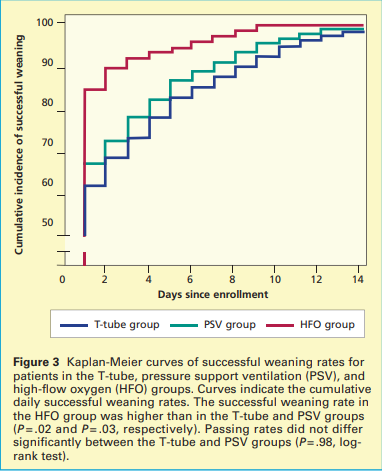Introduction
This article sought to evaluate whether high-flow oxygen (HFO) therapy improves efficiency when weaning patients from mechanical ventilation (Liu et al., 2019). This therapy has been used widely in clinical practices, but its application in weaning patients from mechanical ventilation is not reported sufficiently, hence the need for this study.
Research Questions
Research questions are not stated, but they could be deduced:
- Would HFO therapy shorten the time taken to wean patients from mechanical ventilation?
- Would HFO therapy reduce the need for re-intubation after the endotracheal tube has been removed?
Hypothesis
HFO therapy would shorten the time needed for patients to pass the SBT and would also help minimize the need for re-intubation after removal of the endotracheal tube.
Methods
A prospective study design was used. 268 patients on mechanical ventilation for at least 48 hours were selected randomly and assigned into 3 groups (T-tube, pressure support ventilation, (PSV) or high-flow oxygen (HFO). Participants observed for 2 hours of spontaneous breathing for 14 days and followed until discharge or death.
- Independent variable: HFO therapy.
- Dependent variable: Speed of weaning.
The effectiveness of HFO therapy in speeding weaning from mechanical ventilation was measured. The study was approved by the relevant authorities.
Informed consent from guardians of the patients was obtained as part of the ethical code of conduct.
Results and conclusion

257 patients were weaned successfully; 11 failed. The pass rate for 2-hour SBT was higher in HFO and PSV groups than in the T-tube group. The time needed to pass the 2-hour SBT was less in HFO and PSV groups than in the T-tube group. The Re-intubation rate was significantly lower in the HFO group than in PSV and T-tube groups.
HFO shortens the weaning time from mechanical ventilation. The results show that HFO supports patients to pass SBT quickly. It decreases re-intubation rates. Hence, improves patient outcomes.
Reference
Liu, F., Shao, Q., Jiang, R., Zeng, Z., Liu, Y., Li, Y., Liu, Q., Ding, C., Zhao, N., Peng, Z., & Qian, K.(2019). High-flow oxygen therapy to speed weaning from mechanical ventilation: A prospective randomized study. American Journal of Critical Care, 28(5), 370-376.